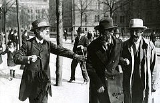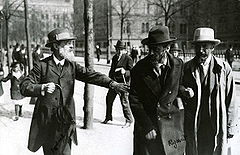
Pavel Axelrod
Encyclopedia

Russia
Russia or , officially known as both Russia and the Russian Federation , is a country in northern Eurasia. It is a federal semi-presidential republic, comprising 83 federal subjects...
n Menshevik
Menshevik
The Mensheviks were a faction of the Russian revolutionary movement that emerged in 1904 after a dispute between Vladimir Lenin and Julius Martov, both members of the Russian Social-Democratic Labour Party. The dispute originated at the Second Congress of that party, ostensibly over minor issues...
.
Early life and career
Born Pinches Borutsch in Potscheff near Chernigov and raised to Shklov, a small provincial town in (currently BelarusBelarus
Belarus , officially the Republic of Belarus, is a landlocked country in Eastern Europe, bordered clockwise by Russia to the northeast, Ukraine to the south, Poland to the west, and Lithuania and Latvia to the northwest. Its capital is Minsk; other major cities include Brest, Grodno , Gomel ,...
) and Mogilev
Mogilev
Mogilev is a city in eastern Belarus, about 76 km from the border with Russia's Smolensk Oblast and 105 km from the border with Russia's Bryansk Oblast. It has more than 367,788 inhabitants...
, the biggest town of the three in the Russian Empire
Russian Empire
The Russian Empire was a state that existed from 1721 until the Russian Revolution of 1917. It was the successor to the Tsardom of Russia and the predecessor of the Soviet Union...
(currently Belarus
Belarus
Belarus , officially the Republic of Belarus, is a landlocked country in Eastern Europe, bordered clockwise by Russia to the northeast, Ukraine to the south, Poland to the west, and Lithuania and Latvia to the northwest. Its capital is Minsk; other major cities include Brest, Grodno , Gomel ,...
), Axelrod was the son of a Jewish innkeeper.
In 1875 in Geneva, Axelrod married his former private student Nadezhda Ivanovna Kaminer. A student himself, Axelrod was Kaminer's and her sister 's tutor
Tutor
A tutor is a person employed in the education of others, either individually or in groups. To tutor is to perform the functions of a tutor.-Teaching assistance:...
. Despite severe financial hardship during the first years, the marriage proved to be successful. They had three children: Vera(22.11.1875), Alexander (18.07.1879) and Sofia (14.11.1881). Nadezhda Ivanovna Axelrod-Kaminer died in 1906.
In the mid-1880s Axelrod established his own small company producing kefir
Kefir
Kefir is a fermented milk drink that originated with shepherds of the North Caucasus region, who discovered that fresh milk carried in leather pouches would occasionally ferment into an effervescent beverage...
. By the end of the 1890s, Axelrod's company had offices in Zurich
Zürich
Zurich is the largest city in Switzerland and the capital of the canton of Zurich. It is located in central Switzerland at the northwestern tip of Lake Zurich...
, Geneva
Geneva
Geneva In the national languages of Switzerland the city is known as Genf , Ginevra and Genevra is the second-most-populous city in Switzerland and is the most populous city of Romandie, the French-speaking part of Switzerland...
, and Basel
Basel
Basel or Basle In the national languages of Switzerland the city is also known as Bâle , Basilea and Basilea is Switzerland's third most populous city with about 166,000 inhabitants. Located where the Swiss, French and German borders meet, Basel also has suburbs in France and Germany...
, which provided steady income and allowed him to support revolutionaries. In 1908, Axelrod sold his company in exchange for the retirement payments to him from the new owner.
Marxist revolutionary
Influenced by Mikhail BakuninMikhail Bakunin
Mikhail Alexandrovich Bakunin was a well-known Russian revolutionary and theorist of collectivist anarchism. He has also often been called the father of anarchist theory in general. Bakunin grew up near Moscow, where he moved to study philosophy and began to read the French Encyclopedists,...
in his youth, he remained an Idealist even after adopting the Marxist philosophy of historical materialism
Historical materialism
Historical materialism is a methodological approach to the study of society, economics, and history, first articulated by Karl Marx as "the materialist conception of history". Historical materialism looks for the causes of developments and changes in human society in the means by which humans...
. Axelrod co-founded the Marxist group Emancipation of Labor in Switzerland
Switzerland
Switzerland name of one of the Swiss cantons. ; ; ; or ), in its full name the Swiss Confederation , is a federal republic consisting of 26 cantons, with Bern as the seat of the federal authorities. The country is situated in Western Europe,Or Central Europe depending on the definition....
with his lifelong friend Georgi Plekhanov
Georgi Plekhanov
Georgi Valentinovich Plekhanov was a Russian revolutionary and a Marxist theoretician. He was a founder of the Social-Democratic movement in Russia and was one of the first Russians to identify himself as "Marxist." Facing political persecution, Plekhanov emigrated to Switzerland in 1880, where...
and Vera Zasulich
Vera Zasulich
Vera Ivanovna Zasulich was a Russian Marxist writer and revolutionary.-Radical beginnings:Zasulich was born in Mikhaylovka, Russia, one of four daughters of an impoverished minor noble. When she was 3, her father died and her mother sent her to live with her wealthier relatives, the Mikulich...
in 1883. In 1900, Axelrod, Plekhanov and Zasulich joined forces with younger revolutionary Marxists Julius Martov
Julius Martov
Julius Martov or L. Martov was born in Constantinople in 1873...
, Vladimir Lenin
Vladimir Lenin
Vladimir Ilyich Lenin was a Russian Marxist revolutionary and communist politician who led the October Revolution of 1917. As leader of the Bolsheviks, he headed the Soviet state during its initial years , as it fought to establish control of Russia in the Russian Civil War and worked to create a...
and Alexander Potresov
Alexander Potresov
Alexander Nikolayevich Potresov was a Russian social democrat and one of the leaders of Menshevism. He was one of six original editors of the newspaper the Iskra.-Life:...
and the six edited Iskra
Iskra
Iskra was a political newspaper of Russian socialist emigrants established as the official organ of the Russian Social Democratic Labour Party. Initially, it was managed by Vladimir Lenin, moving as he moved. The first edition was published in Stuttgart on December 1, 1900. Other editions were...
, a Marxist newspaper, from 1900 to 1903. When Iskra supporters split at the Second Congress of the Russian Social Democratic Labor Party in 1903, Axelrod sided with the Menshevik
Menshevik
The Mensheviks were a faction of the Russian revolutionary movement that emerged in 1904 after a dispute between Vladimir Lenin and Julius Martov, both members of the Russian Social-Democratic Labour Party. The dispute originated at the Second Congress of that party, ostensibly over minor issues...
faction against Vladimir Lenin's Bolshevik
Bolshevik
The Bolsheviks, originally also Bolshevists , derived from bol'shinstvo, "majority") were a faction of the Marxist Russian Social Democratic Labour Party which split apart from the Menshevik faction at the Second Party Congress in 1903....
s.
In 1917, after the February Revolution
February Revolution
The February Revolution of 1917 was the first of two revolutions in Russia in 1917. Centered around the then capital Petrograd in March . Its immediate result was the abdication of Tsar Nicholas II, the end of the Romanov dynasty, and the end of the Russian Empire...
Axelrod returned to Russia. By then some Mensheviks had already joined Kerensky
Alexander Kerensky
Alexander Fyodorovich Kerensky was a major political leader before and during the Russian Revolutions of 1917.Kerensky served as the second Prime Minister of the Russian Provisional Government until Vladimir Lenin was elected by the All-Russian Congress of Soviets following the October Revolution...
's Provisional Government
Russian Provisional Government
The Russian Provisional Government was the short-lived administrative body which sought to govern Russia immediately following the abdication of Tsar Nicholas II . On September 14, the State Duma of the Russian Empire was officially dissolved by the newly created Directorate, and the country was...
and supported government war policy. Despite all his efforts Axelrod failed to gain Mensheviks' support for a policy of immediate peace negotiations with the Central Powers
Central Powers
The Central Powers were one of the two warring factions in World War I , composed of the German Empire, the Austro-Hungarian Empire, the Ottoman Empire, and the Kingdom of Bulgaria...
.
After the Bolshevik victory
October Revolution
The October Revolution , also known as the Great October Socialist Revolution , Red October, the October Uprising or the Bolshevik Revolution, was a political revolution and a part of the Russian Revolution of 1917...
, which Axelrod called a "historical crime without parallel in modern history", he toured the world rallying socialist opposition to the Bolsheviks.
Axelrod died in exile in Berlin
Berlin
Berlin is the capital city of Germany and is one of the 16 states of Germany. With a population of 3.45 million people, Berlin is Germany's largest city. It is the second most populous city proper and the seventh most populous urban area in the European Union...
in 1928.

